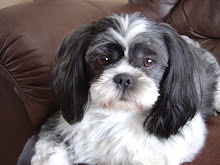
Well, you have just returned from the pet store with your Chihuahua puppy. You sit down and start looking around for the owner's manual . . . What no owner's manual?
Unfortunately your cute little puppy, like a human baby, doesn't come with an owner's manual. So, it is up to YOU to learn how to care for this charming creature. However, until you get up to speed with your learning program, this article will help you on your way.
Chihuahuas, are a good breed for small homes, apartments or city dwellers, because they are very small dogs and are mainly house pets. You should NEVER let them outdoors by themselves. They do not know they are tiny and will challenge the biggest dog on the block because they are very protective and extremely self confident. If you take your pet outside, make sure he is on a harness and leash and do not leave him unattended. There have been unconfirmed reports of these little dogs being carried off by large birds of prey and coyotes.
Care and feeding.
You should consult your veterinarian about the nutritional needs of your puppy but after weaning (up to six weeks), puppies should be fed four small meals a day until three months old; from three months to six months they should be fed three meals a day and from six months to a year they should be fed twice a day. After one year, once a day is fine, however, Chihuahuas prefer several small meals as opposed to one big meal per day with regular adult dog food. Sometimes, canned food is difficult for this breed to digest, resulting in diarrhea, so you may want to avoid the use of canned food.
Bathing your puppy should be done about once a month. Bathing too often may remove the natural oils from the coat and result in dandruff. Shampooing on a monthly basis can actually enhance the sheen of the coat. Be careful not to get water into your dog`s ears, as an infection could develop.
Technically speaking, Chihuahuas remain puppies for about two years. This is the training period and you should begin training as soon as you get him settled in your home (about two days). To assist you in raising your puppy please refer to the following entries:
April 3, 2009, "When Should You Start Training a Puppy"
April 28, 2009,"An Overview of Dog Training"
May 10, 2009, "How to Stop Your Puppy From Jumping Up"
May 15, 2009, "How to Potty Train Your New Puppy"
May 27, 2009, "Teach Your Child to be Safe With a Puppy"
May 28, 2009, "10 Foods You Should NEVER Feed Your Dog"
May 30, 2009, "A Guide to House Training Your Puppy"
June 1, 2009, "Dog Ownership Resonsibilities"
June 2, 2009, "The Rewards of Training Your Dog"
June 9, 2009, "Training Your Dog to Sit."
Puppies and adults should have access to fresh clean water at all times. His bowls should be scrubbed, at least once every couple of days, with very hot water, but avoid using dish soap as the odor and residue may cause him to shy away.
Trimming your puppy's nails should be a monthly event. You can use a cat claw trimmer and it is best to start this nail-trimming routine early-on so that your dog becomes accustomed to the clipping of the nails and to the use of the trimmer. If you feel that you are unable to trim your dog`s nails, you can get your dog`s groomer to do it, or you can have it done by your veterinarian.
Consult your veterinarian on the periodic cleaning of your Chihuahua's ears and teeth and regular vaccinations.
It is best to visit a local veterinarian when your puppy is eight or nine weeks of age. Your puppy will probably need additional vaccinations. You should bring the puppy's vaccination record that you received when you purchased him. If you did not get a vaccination record, return to the location where you purchased your puppy and see if they have the record. If they do not, find out the name of the veterinarian who administered the first vaccinations to your puppy and request a vaccination record from that vet.
At your first visit to the veterinarian with your puppy, he should either be de-wormed or given a fecal test for worms or other parasites. The de-worming is less hassle and expense than the test and will not harm your pup.
The veterinarian may suggest that you brush your pet’s teeth. The small breeds like the Chihuahua have more dental problems than the standard and larger breeds. Obviously the anatomies of the smaller breeds have left the teeth more crowded in the jaw and, with little space between the teeth, enable more harmful bacteria to remain in the mouth, hence the need for brushing.
Also, you should be aware of the fact Chihuahuas are prone to weak knees. This problem may occur as your pet gets older. If your Chihuahua has trouble walking, take him to the vet immediately.
Try to stay with the same veterinarian or treatment facility and keep good records. It is important for your pet's health.
You must remember that this is just an introductory part of your "owner's manual" to start you off on the right path to giving quality care to your puppy. You should learn more from books and other Chihuahua owners.
More importantly, your Chihuahua needs much tender loving care with human contact, touching, petting and general attention.
Chihuahuas are by nature gentle, loyal and sweet-tempered and they will give a lot of love and affection to you in return for your care. You will never be alone with a Chihuahua in your household.
Until next time,
Teia
PS. Refer to an entry made March 24, 2009, titled “Dog Breeds – The Chihuahua” for more information on these marvelous little dogs. Also learn about "Frank," my hero.

No comments:
Post a Comment